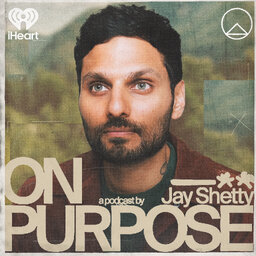3 Things To Do If You're Still Not Over Your Ex
Do you find yourself thinking about your ex often?
What has been the hardest part of moving on for you?
Today, Jay taps into the emotional complexities of getting over an ex and provides actionable steps to move forward. Drawing on insights from neuroscience and psychology, Jay explains why it's entirely normal to struggle with letting go of a past relationship, even if it's been months or years. The emotional pain we experience after a breakup, he explains, is comparable to drug withdrawal, highlighting the deep biological connections we form with our partners.
One of the most impactful ideas Jay shares is that clinging to the past steals energy and time from the future. By ruminating over what could have been, we rob ourselves of the opportunity to build new experiences and relationships. Ultimately, Jay’s message is clear: while it's natural to struggle with letting go, the key to healing lies in breaking old patterns, embracing new habits, and shifting our focus toward growth. If you or someone you know is struggling to move on from a past relationship, this episode offers practical tools and compassionate advice to help start the journey toward healing.
In this episode, you'll learn:
How to Heal by Changing Your Environment
How to Replace Emotional Attachment After a Breakup
How to Shift Focus from the Past to the Present
How to Build Confidence Without External Validation
How to Move On by Breaking Old Patterns
Trust that with patience and self-compassion, you will find the strength to not only move on, but to thrive in ways you never imagined. You deserve the love and happiness that comes from within—keep moving forward, you're stronger than you know.
With Love and Gratitude,
Jay Shetty
What We Discuss:
00:00 Intro
02:29 What to Do If You’re Still Not Over Your Ex?
04:11 What Research Shows About Breakups
07:20 #1: Change Your Environment
13:26 #2: Identify What You’re Missing: Habit or Emotion
17:18 #5: Focus on Building Your Life
In 1 playlist(s)
On Purpose with Jay Shetty
My name is Jay Shetty, and my purpose is to make wisdom go viral. I’m fortunate to have fascinating …Social links
Follow podcast
Recent clips

The REAL Reason You Feel Behind (It’s Not What You Think!) Use THIS Simple Reset to Make Confident Decisions
21:57

NICK JONAS: The REAL Story Behind a Lifetime of Fame, His Inner Critic, and How Fatherhood Changed Everything
1:11:23

Sales Expert Shelby Sapp: The Simple Sales Framework You Can Use in Work, Money, and Relationships (Follow THIS Method to FINALLY Get The Life You Deserve)
1:41:31
 On Purpose with Jay Shetty
On Purpose with Jay Shetty